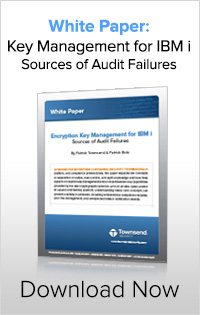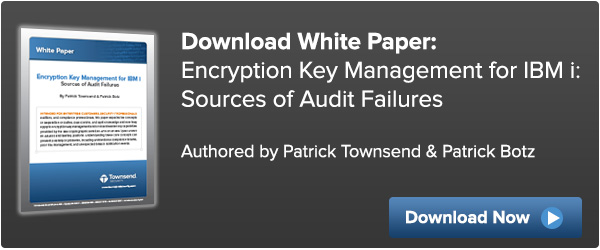Patrick Botz, founder of Botz and Associates and former Lead Security Architect at IBM, recently published a White Paper in conjunction with Townsend Security discussing dual control, split knowledge, and separation of duties--three critical controls needed to protect encryption keys and encrypted data on the IBM i platform. These controls are considered “best practices” in the IT industry, and it is common knowledge amongst security professionals that without these controls in place, any organization could be at risk for a major data breach.

Just like financial controls that are put in place to prevent fraud in a business, these concepts are used in IT security to prevent data loss. As data breaches are reported in the news almost every day, we can easily see the consequences of data loss: public scrutiny, hefty fines, lost business, and litigation are just a few of the ramifications. Implementing these controls reduces the potential for fraud or malfeasance caused by the mishandling of data or a data loss event due to hackers, employee mistakes, or stolen or lost hardware.
In this white paper Patrick Botz outlines the importance of these three controls and explains why they must be used to protect data stored in IBM i databases. Botz discusses on-board master key capabilities provided by the IBM Cryptographic Services APIs on an IBM i, the limitations of the IBM i Master Key Facility, and why organizations should use third-party key management to protect their sensitive data.
The top 3 critical best practices are:
Separation of Duties - This is widely known control set in place to prevent fraud and other mishandling of information. Separation of duties means that different people control different procedures so that no one person controls multiple procedures. When it comes to encryption key management, the person the person who manages encryption keys should not be the same person who has access to the encrypted data.
Dual Control - Dual control means that at least two or more people control a single process. In encryption key management, this means at least two people should be needed to authenticate the access of an encryption key, so that no one single person has access to an encryption key
Split Knowledge - Split knowledge prevents any one person from knowing the complete value of an encryption key or passcode. Two or more people should know parts of the value, and all must be present to create or re-create the encryption key or passcode. While split knowledge is not needed to create data encryption keys on the IBM i, it is needed for the generation of master keys which are needed to protect data encryption keys. Any encryption keys that are accessed or handled in the clear in any way should be protected using split knowledge.
The three core controls should always be used when storing or transferring encrypted sensitive data. A certified, hardened security module (HSM) designed to secure data encryption keys and key, or master, encryption keys should implement these controls into the administration of the key manager. NIST FIPS 140-2 validation is an important certification to look for in an encryption key manager. This certification ensures that your key manager has been tested against government standards and will stand up to scrutiny in the event of a breach.
Automatic Encryption on V7R1
With the release of IBM i V7R1, users can now encrypt data automatically with no application changes. This is great news for IBM i users since encryption has been a difficult task in the past, needing specialized encryption solutions for earlier versions of IBM i. Protecting your encryption keys in a an external key management HSM is the critical next step to protecting your encrypted data.
To learn more about encryption key management for the IBM i download the full White Paper “Encryption Key Management for IBM i - Sources of Audit Failures,” by IBM i security experts Patrick Botz and Patrick Townsend.

